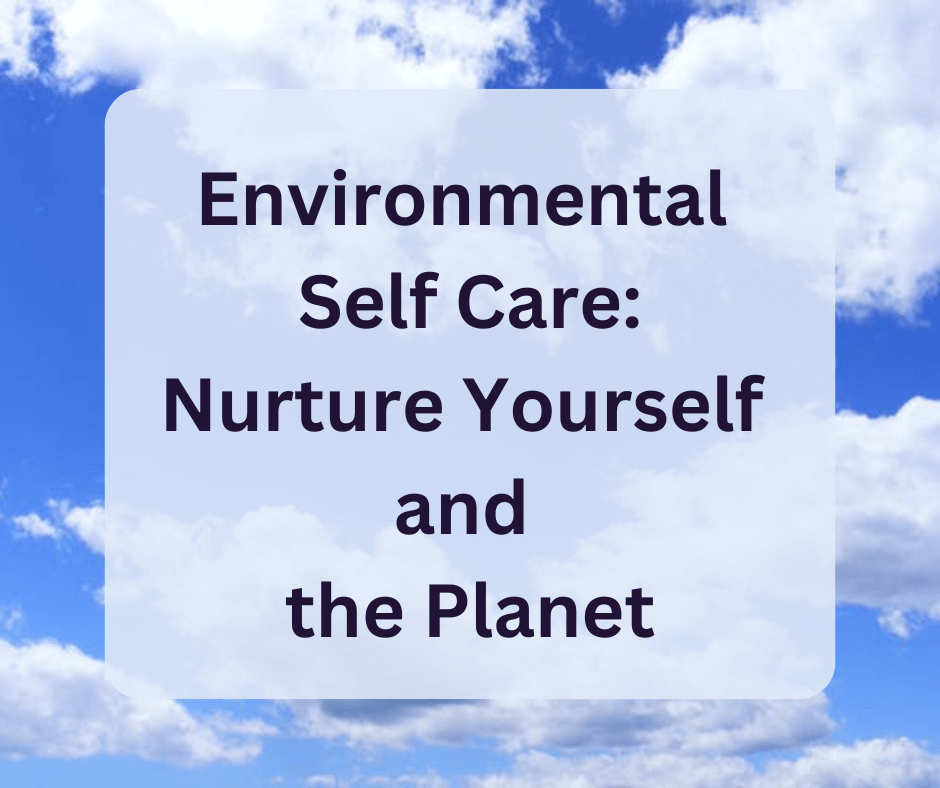Self care isn’t just about personal rituals – it’s about connecting with the world around us. Environmental self care represents a transformative approach to wellness that recognises the deep interdependence between individual health and planetary well-being. By understanding how our personal choices impact the environment, we can create meaningful practices that nurture both ourselves and the Earth.

In this article, we will explore
- what is environmental self care
- why it is important
- how it can contribute to your overall well-being, and
- how to make it a part of your daily self care practices.
So let’s deepdive into what it means to adopt an earth-centred wellness mindset!
Understanding Environmental Self Care
Environmental self care is the practice of looking after your well-being, while being aware of – and attuned to – the environment around you. And if you think there is no connection between your well-being and the environment, think again. Air pollution alone is responsible for headaches and anxiety, asthma, lung cancer and cardiovascular disease, to name but a few.
Your immediate environment is also responsible for your mood. Studies have shown that people who have regular access to parks, forests and gardens, have better physical and mental health, as well as improved well-being. Doctors in Japan actually prescribe forest bathing as a treatment for both mental and physical wellness.
It makes sense, if you think about it: human beings have an innate inclination towards nature, which is their evolutionary habitat. We were not meant to spend our entire lives in concrete jungles, inhaling toxic fumes.
So if you want to step up your self care, it’s time to have a holistic approach and incorporate environmental wellness into your daily practices.
Mindful Consumption and Sustainable Practices
One of the first steps you can take in your environmental self care journey is adopting a more mindful approach towards consumption and sustainability.
We live in a world where everything is about buying more.
You’re in a bad mood? Go on a shopping spree.
You had a bad day? Get yourself some comfort food.
Your neighbour has a fancy car? Time to work harder and get yourself an even fancier one.
The problem is, this mindless overconsumption is draining the planet’s resources and is the main culprit for the acceleration of global warming. The ecosystems are affected by it, nature around us is affected, and so are we.

There are a few simple tweaks you can make to adjust your lifestyle to benefit both your well-being, and the planet’s.
1. Reduce Your Personal Environmental Footprint
Your personal environmental footprint is the impact your everyday activities have on the environment. Every choice you make has an impact on the planet – from the things you buy, to your choice of holiday destination. Everything requires energy and resources.
You can start reducing your environmental footprint, by being more conscious and intentional in your choices. Here are a few things you can start doing right now in your environmental self care journey:
- Reduce your use of single-use, disposable plastics. Studies show that we now have plastic in our brains, and the amount of plastic we ingest is growing ever year. Now that’s scary!
- Reduce your waste. From food to clothing, make sure you only buy what you need and that you use up your products before buying new ones.
- Drive less. The use of fuel is one of the top polluters in our world. You can contribute less to it by cycling or using public transportation. Not only is it good for the planet, but it’s also great for your health and you wallet. How’s that for a win-win situation?
- Reduce water use. Did you know that 1% of the Earth’s water is available for human consumption? Time to be more mindful of how you use it then! Start with small steps, like not letting the water run while are brushing your teeth.
- Support local businesses. Buying locals is not only good for the businesses in your region. It also prevents he consumption of huge quantities of fuel, which is required to ship products all around the world.
2. Make Conscious Consumer Choices
Environmental self care is about changing your mindset: from consumer-driven to intentional.
Before purchasing something, try to answer these questions first:
- Why am I buying this product?
- Do I need it, or do I want it?
- Could I do without it?
- Are there any products already in my possession that could serve the same function?
- Would I still want it in a week’s time?

It’s not about a scarcity mindset. You don’t have to deprive yourself of the things and activities you love, that’s not the goal. But rather to get you to actually think before buying. For example: do you really need that second brown leather bag, or could you make do with the one you already have?
If you ask yourself these questions, you will be surprised to notice how many things you don’t need enter your life every day.
3. Explore Minimalism and Intentional Living
One of the side effects of conscious consumption is a clutter-free life. When you don’t surround yourself with stuff, when you don’t equate your happiness or well-being with the material objects you can buy, you will notice your mindset will shift and you will feel more free mentally.
Most people who adopt a minimalist lifestyle talk about mental clarity and reduced anxiety as being the first noticeable effects. The degree of minimalism you adopt in your lifestyle is up to you. You don’t have to strip your home bare and live a frugal life. A minimalist lifestyle is customisable.
Like with everything, do what works for you. Stat exploring the minimalist lifestyle from a place of curiosity, rather than following a strict set of rules. Play around with it and have fun.
Nature Connection Techniques
When it comes to environmental self care, nothing is more effective and easy to achieve as connecting with nature. We have evolved in nature, and we are part of it. Our circadian rhythm, our mood, our physical health are all connected to the environment around us. Nature cleanses the air we breathe and soothes our nervous system.
So if you want to care for yourself, the easiest thing you can do is nature therapy.
We spend way too much time indoors, in front of screens, mostly immobile. While this can’t be helped during working hours, we can definitely change the way we choose to spend our free time.
- Instead of Netflix and gaming, try going for a walk in your local park.
- Instead of catching up with your friends in a bar, arrange to meet somewhere in nature.
- Instead of having a meal in a restaurant at the weekend, go for a picnic.
- Pick up new hobbies that require you to be in nature, such as gardening or hiking.
Arrange your life in such a way that your entertainment is centred around nature. Change your mindset to prioritise connecting with nature. See if your favourite activities can be moved outside. And try to convince your friend to join you as well. Chances are, they are bored with the same old places and activities anyway.
Mental Health and Environmental Awareness
We’ve already discussed the impact your connection with nature and the environment can have on your mental health. And if you try implementing some of these suggestions, you will see an improvement in mood right away.
However, focusing on environmental self care can also have a less desired side effect – eco-anxiety. While we become more aware of our interdependency with nature, we also become more aware of the degradation of nature.

We are constantly bombarded with news about record-breaking temperatures, increasingly violent weather phenomena and failing ecosystems. It can be quite overwhelming, particularly if you are close to nature and feel part of it.
While brushing off this kind of information is not possible – or even advisable – it’s important to also learn to insulate ourselves against bad news and protect our mental health. It doesn’t mean we should stop caring about the environment. But it’s worth understanding that a depressed and defeated mindset doesn’t help us, and it doesn’t help the environment.
To keep your spirits up and build resilience in the face of ecological threats, find a community-based ecological support network. This will also boost your social life, which is an essential ingredient for a healthy and fulfilled life. Social self care is a pillar for your mental and emotional well-being. More on the benefits of social self care here:
Connecting with like-minded people and engaging in actions that are meant to make a difference will help you feel empowered.
If you don’t know where to start, look up environmental groups in your local area. Find facebook groups of like-minded people. If you can’t find any near you, maybe it’s time to start one yourself. It’s a wonderful opportunity to meet new people, be engaged and create purpose.
Organise forest or beach clean-ups with your friends. It’s a refreshing change from your usual activities, it helps you move your body and stay in nature, while doing something that makes you feel useful.
Conclusion
Environmental self care is more than a trend – it’s a powerful approach to personal and planetary healing. By embracing practices that nurture both individual and ecological well-being, we can create meaningful, sustainable change that resonates far beyond our immediate experience.

